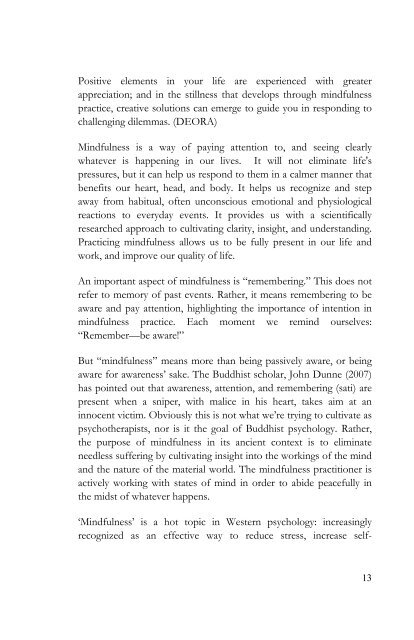- Page 3 and 4: Cover: meditating Shiva - Rishikesh
- Page 5 and 6: “Peace comes from within. Do not
- Page 7 and 8: Basic aspects: body, breath, though
- Page 9 and 10: Mindful Movement 3.................
- Page 11 and 12: Discussion.........................
- Page 13: What is Mindfulness? Have you ever
- Page 17 and 18: The ABC of Mindfulness A is for awa
- Page 19 and 20: How Mindfulness affects mind and bo
- Page 21 and 22: simplified environment, even in the
- Page 23 and 24: wanders. This develops a degree of
- Page 25 and 26: Making matters a bit more complicat
- Page 27 and 28: Helping keep people resilient Numer
- Page 29 and 30: themselves and others, and nearly 7
- Page 31 and 32: fine - its just what brains do, but
- Page 33 and 34: experience of transcendence. Rather
- Page 35 and 36: How do these processes unfold toget
- Page 37 and 38: This takes many forms. One track is
- Page 39 and 40: Mindfulness and therapy Throughout
- Page 41 and 42: difficult experience, and noticing
- Page 43 and 44: Differences between Awareness, Cons
- Page 45 and 46: umination, depression, and anxiety
- Page 47 and 48: 3. Awareness Awareness is inherentl
- Page 49 and 50: Sources: © Mindfulnet.org | create
- Page 51 and 52: other hand, though, the way to unco
- Page 53 and 54: cushion you can use one designed fo
- Page 55 and 56: Feel it as it comes into your body
- Page 57 and 58: occurred." I like to think of it as
- Page 59 and 60: Mindfulness Meditation Therapy (MMT
- Page 61 and 62: Dukkha Dukkha is a state of psychol
- Page 63 and 64: and often this skill alone is suffi
- Page 65 and 66:
sorry for ourselves and certainly i
- Page 67 and 68:
5. Resolution The final step of MMT
- Page 69 and 70:
Mindfulness in the workplace How pr
- Page 71 and 72:
Benefits include improvements to ph
- Page 73 and 74:
Practising mindfulness helps coache
- Page 75 and 76:
Mindfulness Based Cognitive Therapy
- Page 77 and 78:
Long-term skills from MBCT Particip
- Page 79 and 80:
Stop trying to force pleasant feeli
- Page 81 and 82:
Everyday-life practice & coping: Th
- Page 83 and 84:
Mindfulness meditation Mindfulness
- Page 85 and 86:
Two primary stages in this practice
- Page 87:
5. Live your own truth. As a teenag
- Page 90 and 91:
Gradually the individual becomes tr
- Page 92 and 93:
counter the “mindless” state of
- Page 94 and 95:
Urges for substance use rarely last
- Page 96 and 97:
which required concentration. They
- Page 98 and 99:
Urge Surfing Summary Purpose To exp
- Page 100 and 101:
If we are guiding a client through
- Page 102 and 103:
- Prochaska, J. O., Diclemente, C.
- Page 104 and 105:
6. Ask people you trust to give you
- Page 106 and 107:
This technique involves no criticis
- Page 108 and 109:
"You can't stop the waves, but you
- Page 110 and 111:
Exercise 2: Mindfulness Meditation/
- Page 112 and 113:
Exercise 4: Visualization This exer
- Page 114 and 115:
Exercise 6: Mindful Movement Exerci
- Page 116 and 117:
Start with feet slightly apart and
- Page 118 and 119:
Mindful Movements 7 Stand with hand
- Page 120 and 121:
Exercise 7: Deora Core Elements of
- Page 122 and 123:
you have not really changed anythin
- Page 124 and 125:
naturally slow down and deepen, wit
- Page 126 and 127:
drawn into endless ruminations. The
- Page 128 and 129:
Exercise 6: Extended sitting medita
- Page 130 and 131:
9. As best you can, bring a quality
- Page 132 and 133:
9. Continue to scan the body, linge
- Page 134 and 135:
Learn from the teachers 1. Teaching
- Page 136 and 137:
Domain 1: Coverage, pacing and orga
- Page 138 and 139:
Domain 2: Relational skills Mindful
- Page 140 and 141:
Formal mindfulness practices offer
- Page 142 and 143:
participant’s expressed experienc
- Page 144 and 145:
The teacher conveys this through se
- Page 146 and 147:
All practices need to incorporate 3
- Page 148 and 149:
Raisin practice Key learning (featu
- Page 150 and 151:
our well-being; in particular the f
- Page 152 and 153:
the abdominal wall as you breathe i
- Page 154 and 155:
Elements to consider in guiding (fe
- Page 156 and 157:
3. Bring awareness to any urges you
- Page 158 and 159:
Thoughts and emotions - Relating to
- Page 160 and 161:
the present moment and the task at
- Page 162 and 163:
desire to change or control it. Not
- Page 164 and 165:
Examples of how this needs to be at
- Page 166 and 167:
e little explicit care given to wha
- Page 168 and 169:
2. Breath guidance: Helpful guidanc
- Page 170 and 171:
- This domain assesses the process
- Page 172 and 173:
1. Layer 1 - noticing sensations, t
- Page 174 and 175:
‘progression’ through the inqui
- Page 176 and 177:
o Confidence in the teaching proces
- Page 178 and 179:
(iv)leadership style which offers s
- Page 180 and 181:
179
- Page 182 and 183:
was for them to simply be in the pr
- Page 184 and 185:
experience, this was like looking a
- Page 186 and 187:
185
- Page 188 and 189:
not present”. It was agreed by ev
- Page 190 and 191:
Week three: Mindfulness creates a s
- Page 192 and 193:
Week 3 Today the group started with
- Page 194 and 195:
You are walking down the street and
- Page 196 and 197:
tandem with skills teaching to deal
- Page 198 and 199:
Week 4 When this session began, it
- Page 200 and 201:
A member responded to the above acc
- Page 202 and 203:
Week five: “emotions are messenge
- Page 204 and 205:
just somewhere else most of the tim
- Page 206 and 207:
Invited speaker - Frank Frank (aged
- Page 208 and 209:
Week Six: Knowing what sets me off,
- Page 210 and 211:
Week 6 We began with sitting medita
- Page 212 and 213:
energies that arise from our uncons
- Page 214 and 215:
energy to others and make it safe f
- Page 216 and 217:
215
- Page 218 and 219:
Week eight: Staying clean Agenda: -
- Page 220 and 221:
Finale The group ended with a 10 mi
- Page 222 and 223:
221
- Page 224 and 225:
- One of the major ones was discove
- Page 226 and 227:
Participant 2 How was the course he
- Page 228 and 229:
The day in Wicklow was hard, but he
- Page 230 and 231:
(4) Your work/study Before I was ob
- Page 232 and 233:
(2) Your relationship with others I
- Page 234 and 235:
How could the course have been more
- Page 236 and 237:
What was the most challenging aspec
- Page 238 and 239:
When is the right stage in recovery
- Page 240 and 241:
Participant 6 (part of the intervie
- Page 242 and 243:
However, when taken together with t
- Page 244 and 245:
worker or a counsellor. Six partici
- Page 246 and 247:
It is interesting to note that neit
- Page 248 and 249:
were encouraging and clearly indica
- Page 250 and 251:
themselves that the effect of tryin
- Page 252 and 253:
services. They did not exclude peop
- Page 254 and 255:
o The fifth week mindfulness of min
- Page 256 and 257:
There is no need to judge what happ
- Page 258 and 259:
lip. Wherever the breath tends to a
- Page 260 and 261:
Benefits of mindfulness of the body
- Page 262 and 263:
Meditation instruction: mindfulness
- Page 264 and 265:
3rd Week - Mindfulness of Emotions:
- Page 266 and 267:
The four are: Recognition: A basic
- Page 268 and 269:
doubt. Are any of these more common
- Page 270 and 271:
Sometimes thinking can be strong an
- Page 272 and 273:
stream to take up residence, albeit
- Page 274 and 275:
create a bias in how we see our exp
- Page 276 and 277:
maintain this state of mind after y
- Page 278 and 279:
Mindfulness in daily life As in med
- Page 280 and 281:
WISDOM Mindfulness coupled with con
- Page 282 and 283:
Why look behind you, you can't chan
- Page 284 and 285:
283
- Page 286 and 287:
285

















